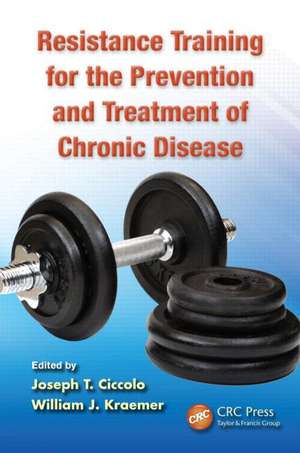Resistance Training for the Prevention and Treatment of Chronic Disease
Editat de Joseph T. Ciccolo, William J. Kraemeren Limba Engleză Hardback – 24 sep 2013
An up-to-date and comprehensive resource, Resistance Training for the Prevention and Treatment of Chronic Disease is an evidence-based guide that presents an in-depth analysis of the independent and positive effects that can result from resistance training. Written by some of the world’s leading exercise physiologists and resistance training researchers and experts, the chapters provide detailed descriptions of the benefits of resistance training for specific clinical populations. They also include guidelines on how to construct a tailored resistance training prescription for each population when appropriate.
The book covers resistance training for effective prevention or treatment of numerous diseases including cardiovascular disease, cancer, type 2 diabetes, renal failure, multiple sclerosis, Parkinson’s disease, fibromyalgia, stroke, depression and anxiety, pulmonary disease, HIV/AIDS, and orthopedic disease. The authors also address resistance training for older adults and for children and adolescents.
| Toate formatele și edițiile | Preț | Express |
|---|---|---|
| Paperback (1) | 545.54 lei 6-8 săpt. | |
| CRC Press – 23 sep 2019 | 545.54 lei 6-8 săpt. | |
| Hardback (1) | 1477.96 lei 6-8 săpt. | |
| CRC Press – 24 sep 2013 | 1477.96 lei 6-8 săpt. |
Preț: 1477.96 lei
Preț vechi: 1555.74 lei
-5% Nou
Puncte Express: 2217
Preț estimativ în valută:
282.85€ • 294.20$ • 233.50£
282.85€ • 294.20$ • 233.50£
Carte tipărită la comandă
Livrare economică 15-29 aprilie
Preluare comenzi: 021 569.72.76
Specificații
ISBN-13: 9781466501058
ISBN-10: 1466501057
Pagini: 301
Ilustrații: 10 black & white illustrations, 22 black & white tables
Dimensiuni: 156 x 234 x 22 mm
Greutate: 0.54 kg
Ediția:1
Editura: CRC Press
Colecția CRC Press
ISBN-10: 1466501057
Pagini: 301
Ilustrații: 10 black & white illustrations, 22 black & white tables
Dimensiuni: 156 x 234 x 22 mm
Greutate: 0.54 kg
Ediția:1
Editura: CRC Press
Colecția CRC Press
Public țintă
Academic, Professional Practice & Development, and Professional ReferenceCuprins
Introduction. Resistance Training Program Variables and Guidelines. Resistance Training for Cardiovascular Disease. Resistance Exercise Interventions across the Cancer Control Continuum. Effects Resistance Training on Insulin Sensitivity and Glycemic Control: Potential Role in the Prevention of Type 2 Diabetes. Resistance Training in Chronic Renal Failure. Beneficial Effects of Progressive Resistance Training in Multiple Sclerosis. Resistance Training for Parkinson’s Disease. Resistance Training for Fibromyalgia. Resistance Training after Stroke. Effects of Resistance Training on Depression and Anxiety. Progressive Resistance Training for Individuals with Chronic Obstructive Pulmonary Disease. Benefits of Resistance Training for HIV/AIDS. Resistance Training for Individuals with Orthopedic Disease and Disability. Resistance Training for Older Adults. Resistance Training for Children and Adolescents. Index.
Notă biografică
Joseph T. Ciccolo, Ph.D., is an assistant professor and researcher in the Department of Biobehavioral Sciences and director of the Applied Exercise Psychology Laboratory in Teachers College at Columbia University in New York. He has received over $2 million in funding from the National Institutes of Health and private foundations for his research investigating the physiological and psychological effects of resistance training for apparently healthy and known disease populations. Dr. Ciccolo is a member of the American College of Sports Medicine and the National Strength and Conditioning Association, and he has authored or coauthored more than 35 papers in the areas of physical activity, public health, and resistance training. He is currently an associate editor for the Journal of Strength and Conditioning Research and a Certified Strength and Conditioning Specialist.
William J. Kraemer, Ph.D., is a full professor in the Department of Kinesiology, working in the Human Performance Laboratory at the University of Connecticut, Storrs. He also holds joint appointments as a full professor in the Department of Physiology and Neurobiology and as a professor of medicine at the UConn Health School of Medicine. Dr. Kraemer is a fellow in the American College of Sports Medicine and the National Strength and Conditioning Association. He has authored and coauthored more than 400 peer-reviewed manuscripts related to resistance training, sports medicine, exercise endocrinology, and sport science. In addition, he has authored or coauthored ten books in the areas of strength training and physiology of exercise. He was awarded the University of Connecticut’s Research Medal in 2005 and the UConn Alumni Association’s Research Excellence Award in Sciences for UConn faculty in 2009.
William J. Kraemer, Ph.D., is a full professor in the Department of Kinesiology, working in the Human Performance Laboratory at the University of Connecticut, Storrs. He also holds joint appointments as a full professor in the Department of Physiology and Neurobiology and as a professor of medicine at the UConn Health School of Medicine. Dr. Kraemer is a fellow in the American College of Sports Medicine and the National Strength and Conditioning Association. He has authored and coauthored more than 400 peer-reviewed manuscripts related to resistance training, sports medicine, exercise endocrinology, and sport science. In addition, he has authored or coauthored ten books in the areas of strength training and physiology of exercise. He was awarded the University of Connecticut’s Research Medal in 2005 and the UConn Alumni Association’s Research Excellence Award in Sciences for UConn faculty in 2009.
Descriere
An evidence-based guide, this book presents an in-depth analysis of the independent and positive effects of resistance training on the prevention, management, and treatment of many chronic conditions. Written by some of the world’s leading exercise physiologists and resistance training experts, the chapters provide detailed descriptions of the benefits of resistance training for specific clinical populations, including guidelines on how to construct a tailored resistance training prescription. Chapters cover resistance training to treat cardiovascular disease, metabolic diseases, cancer, orthopedic diseases, neuromuscular disorders, and more.

















